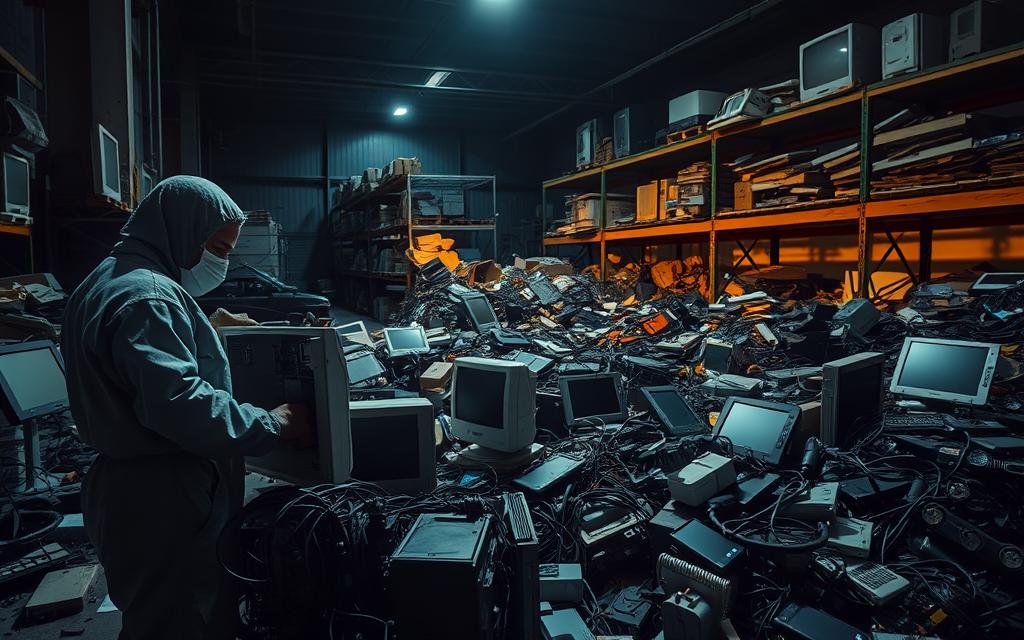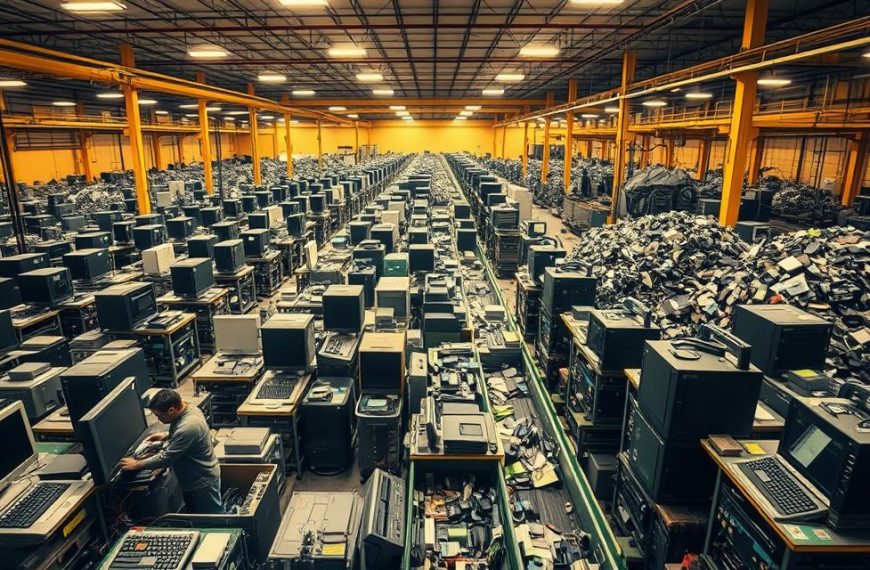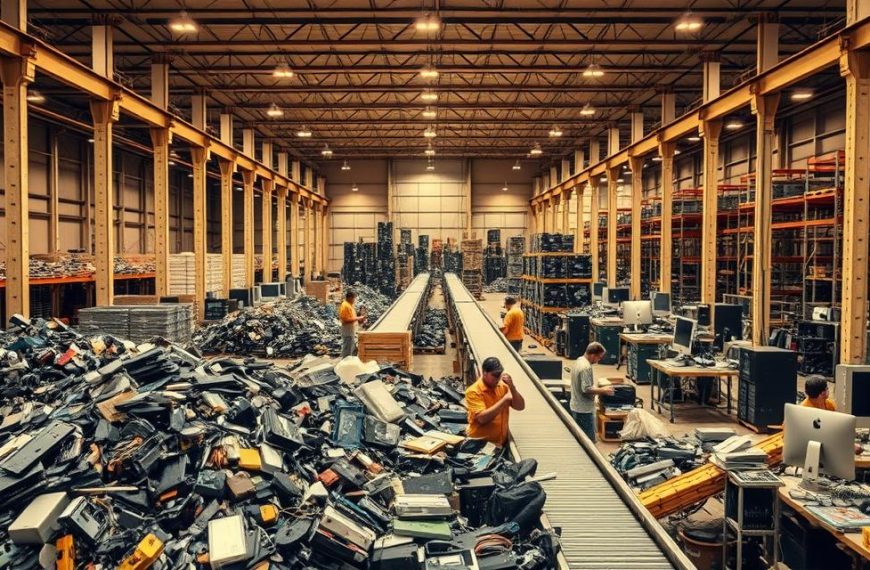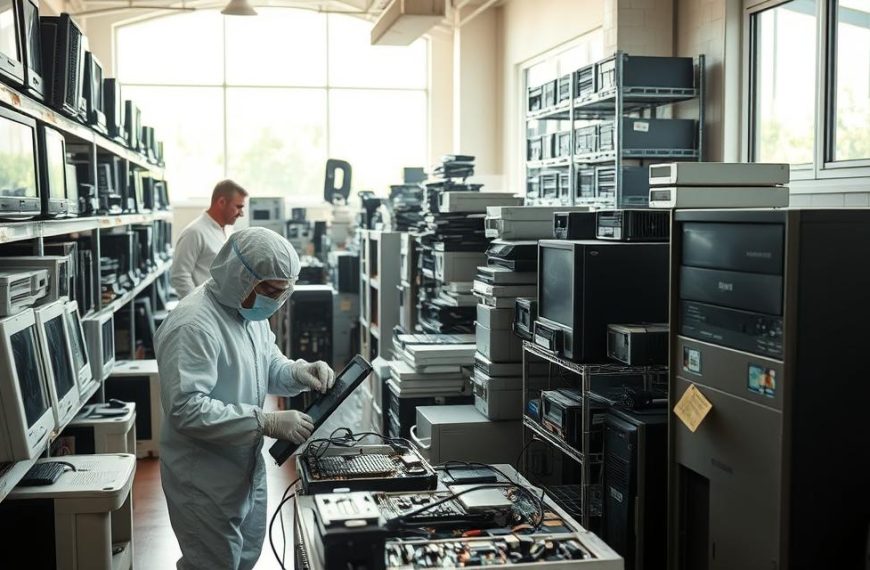Finding the right way to get rid of old electronics is key today. Many homes and businesses have outdated computers and devices. They need special care.
Proper e-waste disposal stops harmful stuff from polluting our world. It also lets us reuse valuable parts through computer recycling.
Finding your closest pc recycle near me spot is important. It makes sure your old tech is dealt with right. Many places have special drop-off points for easy and green disposal.
For instance, Toronto’s electronic waste programme takes computers, laptops, and more for free. These efforts help us dispose of things right and protect our planet.
Understanding the Importance of Proper PC Disposal
Properly disposing of computers is more than just tidying up. It’s a big step for our planet’s health and future. When done right, recycling computers turns dangers into useful things and keeps our data safe.
Environmental Impacts of Electronic Waste
Computers have harmful materials like lead, mercury, and cadmium. If thrown away wrong, these can pollute our soil and water. This harms our environment and the water we drink.
Recycling computers also saves valuable materials. They contain gold, silver, copper, and rare earth elements. These are hard to get from mining. Recycling them cuts down on the harm made by making new electronics.
Here are some facts about recycling computers:
| Material | Recovery Rate | Energy Savings | Landfill Diversion |
|---|---|---|---|
| Gold | 95% | 90% less than mining | 100% |
| Copper | 98% | 85% less than mining | 100% |
| Aluminium | 96% | 95% less than refining | 100% |
| Plastics | 75% | 80% less than new production | 100% |
Legal Requirements for E-Waste Disposal in the United States
The U.S. has laws for managing electronic waste. No single law covers all e-waste, but many rules do.
Twenty-five states have laws that make companies pay for recycling their products. This makes sure companies take care of their electronics when they’re no longer needed.
The Resource Conservation and Recovery Act (RCRA) also plays a role. It controls how hazardous waste is disposed of, including some parts of electronics. Many states have banned throwing away electronics in landfills. So, recycling is not just good for the planet, it’s also the law.
Benefits of Responsible Computer Recycling
Responsible recycling of computers has many benefits. It’s not just about following the law. It’s good for our planet and for keeping our data safe.
Data security protection is a big plus. Professional recyclers make sure all data is destroyed safely. This stops identity theft and protects companies’ secrets.
It’s also good for the environment. Recycling cuts down on pollution and saves natural resources. It helps the planet and supports a cycle where materials keep being used.
Recycling computers also helps the economy. It creates jobs in recycling and saves money in manufacturing. This makes recycling a win-win for everyone.
Lastly, recycling keeps our communities healthy. It stops harmful materials from polluting our air and water. This makes our homes and communities safer for everyone.
Finding PC Recycle Near Me Options
Finding places to recycle your old computers is easier than you think. There are many ways to find authorised recycling centres. You can use online tools, look for manufacturer programmes, check with retailers, or visit government websites.
Using Online Recycling Locator Tools
Online platforms are the best way to find recycling centres near you. They let you search by postcode or city. You can also filter results by the type of equipment you want to recycle.
Recycle My Electronics has a huge database with over 2,500 recycling points in Canada. Their website has:
- Interactive maps with driving directions
- Operating hours and contact information
- Lists of what each location accepts
- News about special collection events
For better results, search using specific terms like “computer recycling”. Many tools also have apps for easy searching on your phone.
Big computer makers offer free recycling for their products. These services usually accept any age of equipment, but some might only take newer items.
Dell, HP, and Apple have big recycling programmes. They include:
- Free shipping labels for mail-back
- In-store drop-off at approved stores
- Services for businesses
- Options for those who need their data wiped
Always check the manufacturer’s website for details and any fees for non-brand items.
Retailer Recycling Services
Many electronics stores offer recycling services, even if you didn’t buy there. Best Buy, Staples, and Office Depot have recycling programmes in most places.
These services often include:
- Free recycling for most small electronics
- Charges for bigger items like monitors and TVs
- Open hours without needing an appointment
- Receipts for your records
Some stores even give you store credit for working items. This is a great way to get paid for recycling responsibly.
Local Government Resources
Local governments have some of the best recycling options. They often have affordable services, which is great for people getting rid of lots of items.
Municipal Waste Management Programmes
Many cities include e-waste recycling in their regular waste services. Toronto’s programme is a good example, with both scheduled collections and drop-off centres.
Common services include:
- Curbside collection on special days
- Open facilities with long hours
- Events for spring and autumn clean-ups
- Info on how to recycle right
Check your local waste management website for details and schedules.
County Recycling Centres
County centres have permanent drop-off spots for electronic waste. They take a wide range of materials, including business equipment.
County centres usually offer:
- No need to live in the area
- Options for businesses
- Handling of special items like servers
- Proof of recycling for compliance
They have many locations, which is great for people in rural areas.
Types of E-Waste Drop-Off Locations Available
Looking for places to recycle your old PCs? You’ll find many types of e-waste drop-off locations. Each one is designed to meet different needs and schedules. Knowing about these options helps you find the best way to get rid of your electronic waste.
Permanent Recycling Facilities
Recycling centres are open all year. They have special equipment to handle electronic waste safely. These centres work with programmes like EPRA/Recycle My Electronics™ to ensure everything is collected and processed right.
Many cities have permanent drop-off spots. They accept computers and other electronics during regular hours. These centres use advanced methods to safely get valuable materials and prevent pollution.
Seasonal Collection Events
Spring and autumn, communities hold temporary collection events. These events are great when you search for places to recycle near you. Local groups and governments sponsor these to make it easier for everyone to recycle.
These events take many electronics, but some items might not be accepted. They’re perfect for those who can’t get to permanent facilities.
“Community collection events dramatically increase participation rates in electronics recycling programmes by removing transportation barriers.”
Retail Drop-Off Points
Many electronics stores now recycle old devices. You can recycle your old PC when buying a new one. Big stores take in computers, monitors, and more, no matter where you bought them.
These programmes are part of big efforts to manage e-waste responsibly. Some stores even give discounts on new purchases if you recycle through them.
Charity and Non-Profit Organisations
Charities offer recycling by refurbishing and reusing working electronics. They work with electronics recycling services to handle non-working items. Donating working computers helps them last longer and supports community projects.
Many charities give tax receipts for donations. This adds to the benefits of recycling, helping both the environment and social causes through technology access.
| Location Type | Availability | Best For | Typical Accepted Items |
|---|---|---|---|
| Permanent Facilities | Year-round | Planned recycling | All electronics including monitors and CPUs |
| Seasonal Events | Limited dates | Community access | Most consumer electronics |
| Retail Drop-Offs | Store hours | Convenience | Small devices and peripherals |
| Charity Organisations | Varies | Working equipment | Functional computers and components |
Each e-waste drop-off option meets different needs in managing electronic waste. Permanent facilities are reliable, while seasonal events make it easier for everyone. Retail programmes offer convenience, and charities help by giving new life to working equipment.
Knowing about these options helps you choose the right place to recycle your old electronics. There’s a place for everyone to dispose of their computing equipment responsibly.
Preparing Your PC for Recycling
Before you take your computer to a recycling centre, make sure it’s ready. This means protecting your data and making the recycling process easier for everyone. Taking the right steps keeps your personal info safe and makes recycling smoother.
Data Security: Backing Up and Wiping Your Hard Drive
First, protect your personal info. Start by backing up all important files to an external drive or cloud storage. After that, wipe your hard drive clean.
Use professional software like DBAN or tools from your computer’s maker for wiping. These tools write over your drive many times, making data recovery very hard. For very sensitive info, you might need to physically destroy it.
Many recycling centres offer certified data destruction services. Always ask for proof that your drive was erased properly. This gives you peace of mind about your data security recycling.
Disassembling Components for Separate Recycling
Some parts need special care when recycling. Check your computer’s website for specific instructions. This helps avoid damaging parts that can be reused or recycled properly.
Common parts that need special handling include:
- Lithium-ion batteries
- Power supply units
- Circuit boards and processors
- Cooling systems with liquids
Use the right tools and safety gear when taking apart your computer. If you’re not sure, many recycling centres will do it for you. Proper separation helps get more materials recycled during computer recycling.
Packaging and Transportation Considerations
Safe transport is important for you and the recycling staff. Use the original packaging if you have it. If not, sturdy cardboard and padding will do.
Here are some tips for transport:
- Put heavier items at the bottom of your container
- Wrap fragile items in bubble wrap or foam
- Put cables and accessories in separate bags
- Mark boxes with sharp edges or fragile items
When carrying multiple items, spread the weight evenly. This prevents damage and makes it easier to handle at the recycling centre. Proper preparation ensures your items arrive safely for recycling.
By following these steps, you help with effective hard drive wiping and recycling. Your attention to detail makes recycling smoother and keeps your personal info safe.
What to Expect at E-Waste Drop-Off Locations
When you visit an electronic waste drop-off, being prepared is key. Knowing what to expect makes the process smoother. It also helps in managing e-waste responsibly.
Documentation and Identification Requirements
Most places ask for ID when you drop off electronics. For homes, a driver’s licence or utility bill usually works. It proves you live locally.
Businesses need more paperwork. They often ask for business registration and waste transfer notes. These documents help track and follow environmental rules.
Some places keep sign-in sheets. This helps them keep track of how much they recycle. It also shows their environmental impact.
Fees and Associated Costs
Many places offer free e-waste disposal for homes. But, some electronics might cost more. This is because they have special materials or are hard to handle.
Televisions and monitors might cost between $10 to $30 each. This is because they have mercury in them.
For businesses, prices can depend on how much they throw away. It’s a good idea to ask about costs before you start. This helps you plan your budget for e-waste disposal.
“Proper e-waste recycling isn’t free, but the environmental cost of improper disposal is far greater.”
Accepted Materials and Restrictions
Most places take a lot of devices. Toronto’s guidelines are a good guide for what’s accepted in North America.
Here are some common items accepted:
- Desktop and laptop computers
- Computer peripherals (keyboards, mice, printers)
- Mobile phones and tablets
- Audio equipment and speakers
- Network equipment and cables
But, some items are not accepted for safety reasons. This includes big appliances, batteries, and electronics with refrigerants. These need special recycling.
| Device Type | Typically Accepted | Common Restrictions | Potential Fees |
|---|---|---|---|
| Desktop Computers | Yes | None | Free |
| CRT Monitors | Yes | Limited quantity | $15-25 |
| Printers | Yes | None | Free |
| Household Appliances | No | All types | N/A |
| Loose Batteries | No | Safety hazard | N/A |
Always check with your local facility before dropping off items. This way, you ensure your e-waste is handled properly. It helps in managing e-waste without any issues.
Alternative Recycling Options Beyond Drop-Off Locations
While drop-off locations are great for computer recycling, there are other ways to manage electronic waste. These options are flexible and convenient for different situations.
Mail-Back Recycling Programmes
Mail-back programmes are a convenient computer recycling option. Many companies and recyclers send free shipping materials to send your electronics to them.
These programmes offer:
- Free shipping labels and boxes
- Certified data destruction services
- Environmentally responsible processing
- Tracking capabilities for your peace of mind
Always check the recycler’s certifications for proper handling. This way, you reduce the environmental impact electronics have in landfills.
Pick-Up Services for Businesses
Businesses with lots of e-waste can use pick-up services. Companies like EPRA offer custom solutions for businesses and cities. They handle everything from scheduling to documentation.
These services include:
- Scheduled collections at your premises
- Bulk equipment handling
- Certificates of destruction for compliance
- Customised reporting for sustainability tracking
Professional pick-up services help businesses meet rules and reduce disruption. They are a full solution for responsible computer recycling.
Donation Options for Functional Equipment
Don’t recycle working computers and parts. Many groups refurbish and give them to schools, non-profits, and communities in need.
Check if your equipment is suitable for donation:
- Computers less than 5 years old are most valuable
- Make sure all data is wiped using professional tools
- Include all necessary peripherals and accessories
- Check the organisation’s criteria before donating
Goodwill, National Cristina Foundation, and local schools often accept donations. These donation options help technology last longer and support community projects.
| Option Type | Best For | Cost Considerations | Environmental Benefit |
|---|---|---|---|
| Mail-Back Programmes | Individual users, small quantities | Often free or low cost | Proper material recovery |
| Pick-Up Services | Businesses, large quantities | Volume-based pricing | Bulk processing efficiency |
| Donation Options | Functional equipment | Potential tax deductions | Extended product lifespan |
Each recycling method has its own benefits. Use recycling locator tools to find the best option for you.
These options work with drop-off locations to create a wide network for electronic waste. Choosing the right method helps the environment and meets your needs.
Conclusion
Proper disposal of your personal computer helps the environment and follows e-waste rules. Looking for reliable places to recycle your PC ensures it’s handled safely. This way, valuable materials are recovered.
There are many ways to recycle electronics, like permanent facilities and seasonal events. You can also drop off items at retail stores or donate to charities. These options help you recycle responsibly and might help others too.
Before recycling, make sure to wipe your hard drive. This step keeps your personal info safe from unauthorized access. It’s key when getting ready to dispose of your computer.
Start looking for places to recycle your PC today. Your efforts help save resources and protect the environment for the future.












